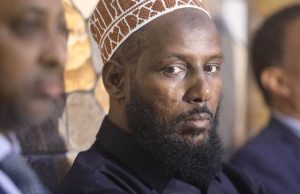
Former al-Shabab deputy leader Mukhtar Robow attends a news conference in Baidoa, Somalia, on Nov. 4. (Feisal Omar/Reuters)
By Max Bearak
NAIROBI — Mukhtar Robow, the former spokesman and deputy leader of the Somali Islamist group al-Shabab, is a surprisingly popular man. After quitting the group in 2013 and formally recognizing Somalia’s government last year, he has successfully shed his association with a militancy that proudly claims countless suicide bombings and institutes a merciless interpretation of sharia law across areas its controls.
His surrender was celebrated as a major symbolic win for Somalia’s government, which has tried to encourage defections. Robow once had a $5 million bounty on his head from the U.S. State Department, but since he defected, he has publicly criticized al-Shabab and even donated blood to victims of one of their attacks last year.
But now Robow is hoping to run for the highest office in his native region of Somalia, and it is clear that this is not what the Somali government had envisioned.
Amid disputes over the legitimacy of Robow’s candidacy, the government has postponed the elections three times. And on Thursday, less than a week before the newest election date, Robow was arrested by Ethiopian soldiers who are part of an African Union-sponsored coalition of government-aligned troops. The government said he was suspected of bringing militants and weapons to Baidoa, the capital of South West State, where he is running for president.
The government “has just woken up to the fact ex-militant Robow has a commanding lead and is likely to be next president of [South West State] in a free context,” said Rashid Abdi, an expert on Somalia at the International Crisis Group.
Robow’s popularity was evident on the streets of Baidoa after his arrest. His supporters filled the streets Thursday and Friday, and sporadic fighting resulted in 11 deaths, including that of a local lawmaker. Videos posted by journalists on social media showed spirited protesters calling for his release along streets littered with debris from rioting.
“The whole town is still completely closed down,” said a Somali employee of a U.N. agency who communicated with The Washington Post from Baidoa by text message and requested anonymity because of fear for his safety.
It is unclear whether Wednesday’s election will be held or postponed again.
The election in South West State would be the first among Somalia’s seven semiautonomous regions at a time when the federal government is trying to consolidate power after decades of civil war and waves of insurgency.
Robow’s arrest raises doubts about the Somali government’s tolerance for regional politicians who want to maintain greater autonomy.
“This looks very much like the federal government trying to exercise its will against the wishes of its member states,” said Matt Bryden, director of Sahan Research, a Somalia-focused think tank. “I don’t see a negotiated way out of this.”
Robow belongs to a regionally dominant clan, the Rahanweyn, and is also seen by many as likely to be stronger against al-Shabab than the government. His arrest could broaden an already brewing standoff between the Rahanweyn and the government in the capital, Mogadishu.
It also could dissuade other clan leaders from defecting from al-Shabab, along with numerous followers who are fighting because of clan ties rather than an ideological affinity with al-Shabab, Bryden said.
Through clan connections, Robow has persuaded 20 senior al-Shabab figures to defect, according to a recent report by the United Nations’ Somalia monitoring group His election slogan roughly translates to “I knew how to found al-Shabab, I know how to finish them.”
The history of al-Shabab is intertwined with Robow’s. He was part of a small group of Somalis who traveled to Afghanistan in the years before the September 11, 2001, terrorist attacks to be trained by al-Qaeda. He returned to Somalia soon after the U.S. invasion of Afghanistan. In 2006, amid massive public resentment toward Ethiopia’s invasion of Somalia, Robow co-founded al-Shabab. By 2011, the group would effectively control most of southern Somalia, including Baidoa and parts of Mogadishu.
Al-Shabab earned the enmity of many Somalis by carrying out attacks on civilians — attacks Robow defended as the group’s spokesman — and by preventing foreign aid from reaching many areas during a famine triggered by drought in 2011 that ultimately killed more than a quarter of a million people. But by 2013, Robow had fallen out with al-Shabab’s leader, or emir, Ahmed Abdi Godane, and sought protection from a Rahanweyn militia until his defection last year. Al-Shabab still controls a significant portion of rural southern Somalia.
Robow remains on the U.S. Treasury Department’s sanctions list, which was the Somali government’s original reasoning for barring his candidacy in this year’s elections. Another sticking point is that the government claims Robow has not formally renounced al-Shabab, though how he would do so has not been made clear.
The U.S. government, which has 500 troops in Somalia and has carried out more than two dozen drone strikes on al-Shabab targets this year, has done little to intervene in the political crisis. Its official stance has been in support of Somalia’s federal government.
If next week’s elections go ahead without Robow, further protests and violence are likely in Baidoa.
“If you lock Robow out, a narrative will emerge that yet again an Islamist utopia was thwarted,” said Abdi, with the International Crisis Group. “This will certainly radicalize another generation.”
Source: The Washington Post


